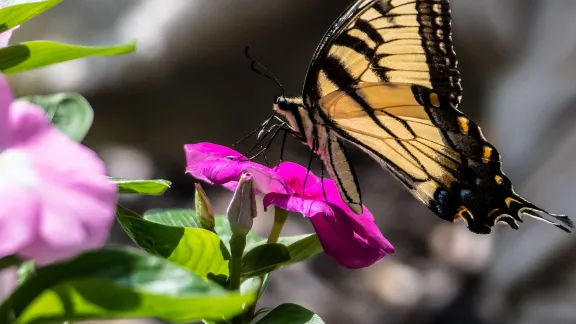
Courtesy: Chuck Moore/Random Snaps Photography
Called to act with urgency to limit human-induced global warming
Addressing a college graduate class in Lewiston, Maine, United States, five years ago, Congressman John Lewis urged, “You must find a way to get in the way and get in good trouble, necessary trouble. … You have a moral obligation, a mission and a mandate, when you leave here, to go out and seek justice for all. You can do it. You must do it.” This “good trouble” principle aligns with the Christians' call to be stewards of creation, saving our home Earth from humanity's destruction while advocating for justice for all of God's creatures. The 2021 Season of Creation theme, "A Home for All? Renewing the Oikos of God," promotes good and necessary troublemaking, as the Celebration Guide reminds us: "The oikos is a home for all but it is now in danger because of greed, exploitation, disrespect, disconnection and systematic degradation."
The Evangelical Lutheran Church in America (ELCA) works toward a just transition for achieving a net-zero sustainable world that leaves no one behind. Just transition requires sustainability—a world where resources are sufficient for current generations without sacrificing future populations. To get on the track for reaching net-zero greenhouse gas (GHG) emissions by 2050, we must focus on energy, transportation, waste, water, and agriculture.
Our efforts are imperative. The most recent Intergovernmental Panel on Climate Change (IPCC) report, Climate Change 2021: the Physical Science Basis, states it is unequivocal that human influence has warmed the Earth. Therefore, we must act with a sense of urgency to limit human-induced global warming by reducing GHG emissions. Without reducing GHG emissions, global surface temperatures will continue to increase resulting in the world suffering from the effects of climate change. The consequences include increased frequency and severity of heatwaves, heavier precipitation, greater frequency and intensity of hurricanes, cyclones, and typhoons, floods, droughts, wildfires, thawing permafrost, melting sea ice, and rising sea levels eroding our coastlines. These conditions destabilize societies, contributing to migration, food insecurity, hunger, and poverty, national security issues, ecosystem losses, and health problems, worsening social and economic injustices as the most vulnerable are disproportionately impacted.
Claiming our role as stewards of creation
Remedying the destruction of our home Earth is a moral obligation. As Lutherans, we recognize our role as stewards of creation. Visualizing Adam (standing for humankind) receiving the vocation to till the ground (creation care), we embrace our mission and recall that for Christians, care of the Earth is not an "environmental cause." Instead, as noted by the theologian David Rhoads, it is central to our holy calling to treasure the Earth and care for it as our typical home, fully integrating creation-care into our love of God, neighbor, and all creation. We claim our role as stewards of creation, nurturing the magnificence of the world created with spectacular beauty filled with synchronization of life and interconnection of all creatures worthy of praising the Creator. "O Lord, how manifold are your works! In wisdom, you have made them all; the earth is full of your creatures." (Psalm 104:24)
God can use our efforts for gain. The need presses, and we must and can use these gifts to make good trouble for a healthy planet.
God can use our efforts for gain. In her 2021 Earth Day statement, ELCA Presiding Bishop Rev. Elizabeth A. Eaton reminds us: "We know that healing is possible — for the planet and our communities. We are not too late. The time is now. To us, God is calling; through us, God wants to work a miracle; through our finite and inadequate efforts, God can and will bring about ‘a new heaven and a new earth.’ God provides us with diverse gifts as protectors and guardians of creation."
The need presses, and we must and can use these gifts to make good trouble for a healthy planet.

Courtesy: Chuck Moore/Random Snaps Photography
Ms Ruth Ivory-Moore is the Program Director for Environment and Energy with the Evangelical Lutheran Church in America.
Many churches in the ecumenical family observe the “Season of Creation” (also known as Creation Time) between 1 September and 4 October, the Feast of St Francis of Assisi, as observed by some Western traditions. For the Lutheran communion, this liturgical season of prayer and action is an opportunity to affirm LWF’s commitment to addressing a major crisis of our time – climate change. “A home for all? Renewing the Oikos of God” is the 2021 theme for the “Season of Creation”.


